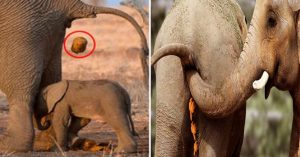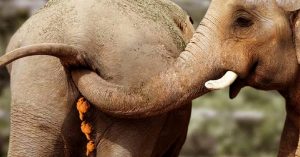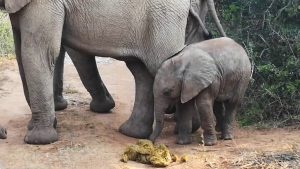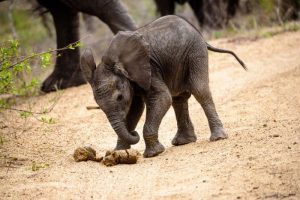The animal kingdom never ceases to amaze us with its peculiar and often bewildering behaviors. Among these, the curious practice of elephant calves consuming their mother’s feces, known as coprophagy, stands out as a unique and fascinating phenomenon. But why do these majestic creatures engage in such behavior?

While the idaof consuming feces may sound unappetizing to humans, for elephant calves, it serves a vital purpose in their early development. This intriguing practice is linked to their quest for crucial nutrients and the intricate dynamics of their digestive systems.

Nutrient Recycling: Elephants are herbivores, and their diet consists mainly of fibrous plant material, which can be challenging to digest. When elephant calves consume their mother’s feces, they are essentially recycling undigested food. This process allows them to extract additional nutrients from the partially digested plant matter, ensuring they receive all the essential elements required for growth.
Gut Microbiome Development: The digestive system of elephants relies heavily on the presence of beneficial microorganisms, particularly bacteria, which help break down complex plant fibers. By consuming their mother’s feces, elephant calves acquire these crucial microorganisms, which are essential for the efficient digestion of their plant-based diet. This early exposure helps establish a healthy gut microbiome.

Maternal Bonding: Coprophagy also plays a role in strengthening the maternal bond. The act of consuming feces is often encouraged by the mother, who may excrete feces specifically for her calf to ingest. This reinforces the close relationship between mother and calf and ensures that the young elephant receives the vital nutrients it needs.
It’s important to note that coprophagy is primarily observed in very young elephant calves and tends to diminish as they grow older and their digestive systems become more efficient. As they mature, their diet shifts to a wider variety of plant material, reducing their reliance on this behavior.

In conclusion, while the practice of elephant calves consuming their mother’s feces may seem unusual to us, it serves a vital purpose in their early development. This fascinating behavior ensures they receive essential nutrients, establishes a healthy gut microbiome, and strengthens the maternal bond. It’s a reminder that the natural world is full of intriguing adaptations and strategies for survival, even when they may appear strange to human observers.



